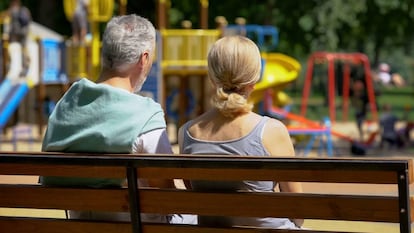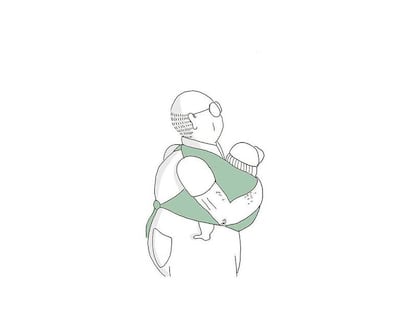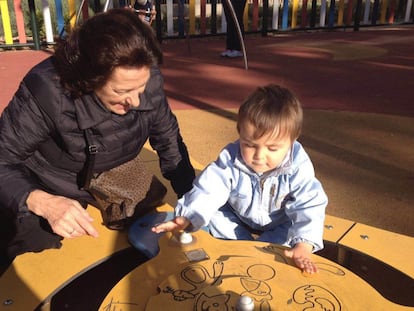¡°They have robbed us of a life with our granddaughters¡±
Spain¡¯s High Court has ordered the Justice Ministry to pay two grandparents €50,000 in damages for failing to protect their right to see their grandchildren

Two Spanish grandparents have been awarded €50,000 in damages after a court failed to enforce an order that allowed them to see their grandchildren. In 2007, when their son Jordi was separating from his wife, Ram¨®n and Margarita went to a court in Catalonia to fight their former daughter-in-law for the right to visit their two granddaughters. The court ruled in their favor, and ordered that they be allowed to see the two girls at least once every two weeks.
The money does not compensate for all that we have lost
Ram¨®n, grandparent
But the mother refused to follow the court order and for years, the grandparents were unable to see their grandchildren. ¡°We traveled 200 kilometers to see them, we knocked on the door and [the daughter-in-law] never let us in,¡± says Ram¨®n, who lives with his wife in a small municipality in the northeastern city of Tarragona.
As the years passed, the couple wrote numerous times to the judge in charge of the case to say they were not being allowed to see the children. But nothing was done.
Now in a pioneering sentence, Spain¡¯s High Court, the Audencia Nacional, has ordered the Justice Ministry to pay Ram¨®n and Margarita €25,000 each, plus interest, in compensation for the judge¡¯s inaction and the lengthy legal process.
¡°The money does not compensate for all that we have lost, so many court cases and we were not able to be with [the granddaughters] or see them grow up,¡± says Ram¨®n, who like his wife, has not seen his grandchildren for 14 years. The couple has lost all hope that things will change. One of the girls is now 18 years old and the other is 16.
¡°They have robbed us of a life with our granddaughters. When we look at each other, we know that we are without them,¡± says Ram¨®n.
We are 76 years old and we would like to be with them before we die
Ram¨®n, grandparent
The mother also stopped the father from seeing the children. After the divorce, she reported Jordi for allegedly abusing one of their daughters. A judge issued a restraining order against him and began criminal proceedings. Jordi was acquitted eight years?later by Tarragona¡¯s High Court, which described the mother¡¯s complaint as ¡°seriously disturbing.¡±
During that eight-year period, Jordi was unable to see his daughters, and when a judge finally allowed him to, the girls did not want to see him. The mother meanwhile continued to put up obstacles to stop him and his grandparents from visiting the girls. As the girls grew up, they refused to see both their father or grandparents.
¡°What good does it do now that the justice system has ruled in our favor if the court order was never met?¡± asks Ram¨®n angrily.
A long wait
Ram¨®n and Margarita initially asked for €200,000 in compensation for psychological damage over the court¡¯s inaction. But the Justice Ministry only agreed to pay €20,000 ¨C €10,000 each. Ram¨®n and Margarita appealed the ministry¡¯s offer at the High Court, which ruled that they be given €25,000 each for the ¡°undue delays of the judge¡± in enforcing his own sentence.
¡°They have grown up and we still know nothing about them. The Justice Ministry has been very slow¡ Years have passed and there has been a lot of suffering. We are 76 years old and we would like to be with them before we die. But time has passed and I fear we will die without that pleasure,¡± says Ram¨®n.
As for the compensation, Jordi says it is far from enough. ¡°We have spent more on lawyers,¡± he says. Jordi is,?however, hopeful that he will be able to reconnect with his daughters in the future: ¡°I think after some years have passed, my daughters will be able to think for themselves, without being influenced, then I will be able to speak with them and tell them everything.¡±
English version by Melissa Kitson.
Tu suscripci¨®n se est¨¢ usando en otro dispositivo
?Quieres a?adir otro usuario a tu suscripci¨®n?
Si contin¨²as leyendo en este dispositivo, no se podr¨¢ leer en el otro.
FlechaTu suscripci¨®n se est¨¢ usando en otro dispositivo y solo puedes acceder a EL PA?S desde un dispositivo a la vez.
Si quieres compartir tu cuenta, cambia tu suscripci¨®n a la modalidad Premium, as¨ª podr¨¢s a?adir otro usuario. Cada uno acceder¨¢ con su propia cuenta de email, lo que os permitir¨¢ personalizar vuestra experiencia en EL PA?S.
?Tienes una suscripci¨®n de empresa? Accede aqu¨ª para contratar m¨¢s cuentas.
En el caso de no saber qui¨¦n est¨¢ usando tu cuenta, te recomendamos cambiar tu contrase?a aqu¨ª.
Si decides continuar compartiendo tu cuenta, este mensaje se mostrar¨¢ en tu dispositivo y en el de la otra persona que est¨¢ usando tu cuenta de forma indefinida, afectando a tu experiencia de lectura. Puedes consultar aqu¨ª los t¨¦rminos y condiciones de la suscripci¨®n digital.










































